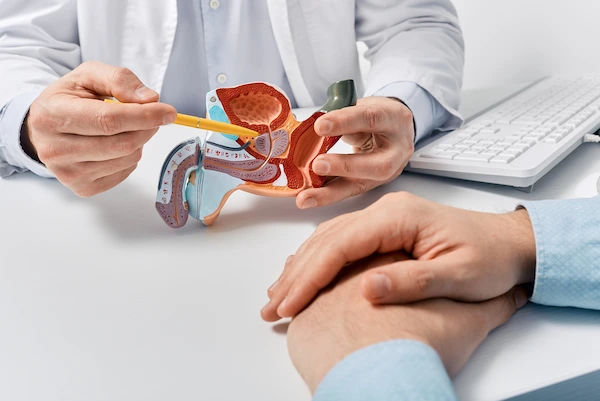Signs of Urinary Bladder Cancer: Don't Ignore These Symptoms
Learn the key signs of urinary bladder cancer, from blood in urine to advanced symptoms. Early detection is vital for better outcomes.


Introduction
Noticing a change in your bathroom habits or a strange colour in your urine can be unsettling. While often linked to common issues like infections, these changes can sometimes be the first clues of a more serious condition, such as bladder cancer. As the sixth most common cancer in the U.S., awareness of its signs is crucial for early detection and successful treatment. This article will guide you through the key symptoms of urinary bladder cancer, from the most common warning sign to the symptoms that appear in later stages. We’ll help you understand what to look for, when to worry, and the critical importance of consulting a healthcare professional for a proper diagnosis. Remember, noticing a symptom early can make all the difference.
What is Bladder Cancer? A Quick Overview
Bladder cancer occurs when cells in the bladder—the hollow, muscular organ that stores urine—begin to grow uncontrollably. Most cancers start in the innermost lining of the bladder.
How the Bladder Works
Think of your bladder as a stretchy, muscular balloon. Its job is to collect and store urine from your kidneys until you are ready to release it. Healthy bladder tissue is designed to expand and contract.
Where Cancer Begins (Urothelial Cells)
Over 90% of bladder cancers begin in the urothelial cells that line the inside of the bladder. These cells are in constant contact with waste products in urine, which may contain cancer-causing agents, making them susceptible to abnormal changes. When these cells mutate and multiply, they can form a tumour.
Consult a Urologist for the best advice
The Most Common Sign: Haematuria (Blood in Urine)
The single most important and common early sign of bladder cancer is haematuria, or blood in the urine. It's so prevalent that it occurs in 80-90% of patients.
Gross Haematuria: What You Can See
Gross haematuria means the blood is visible to the naked eye. Your urine may appear:
Pink, red, or cola-coloured: This is the most typical presentation.
Occasionally orange: Due to a mixture of blood and urine.
It's important to note that the amount of blood isn't related to the severity of the condition. Even a small, visible amount warrants a doctor's visit.
Microscopic Haematuria: What You Can't See
In some cases, the blood is only detectable under a microscope during a urinalysis test. This is why routine check-ups can be vital, as they can catch this hidden sign. You might have microscopic haematuria without any other bladder cancer symptoms.
Other Key Urinary Symptoms to Watch For
Beyond blood, bladder tumours can irritate the bladder wall or block normal function, leading to other changes in urination. These symptoms of bladder issues can mimic a urinary tract infection (UTI), which is why they are often overlooked.
Changes in Bathroom Habits (Frequency & Urgency)
Frequency: Needing to urinate more often than usual, including multiple times at night (nocturia).
Urgency: A sudden, strong, and uncontrollable need to urinate immediately.
Dysuria: Pain or Burning During Urination
This sensation of pain, burning, or discomfort during urination is a classic sign of a UTI. However, if antibiotics don't resolve it, it could point to an underlying tumour causing irritation.
Symptoms of Advanced or Invasive Bladder Cancer
When cancer grows through the bladder wall or spreads (metastasizes) to other parts of the body, it can cause a new set of symptoms. Recognising these signs of advanced cancer is critical.
Pelvic or Back Pain
A persistent pain in the lower back, specifically on one side (flank pain), or in the pelvis can indicate that the cancer is affecting the kidneys or growing into surrounding tissues and nerves.
Unintended Weight Loss and Fatigue
These are systemic symptoms. Unexplained weight loss and a profound, persistent lack of energy often occur when the body is fighting a significant disease like advanced cancer.
Swelling in the Feet and Bone Pain
Swelling in the lower legs (oedema) can happen if the cancer blocks lymph nodes. If cancer spreads to the bones, it can cause significant and persistent bone pain or fractures.
When Should You Absolutely See a Doctor?
You should consult a doctor if you experience any of the symptoms above, especially visible blood in your urine. If symptoms persist beyond two weeks, or if you have visible blood in your urine even once, consult a doctor online with Apollo24|7 for further evaluation. Do not assume it's "just an infection" without a professional diagnosis. Early intervention is the key to the best outcomes.
How is Bladder Cancer Diagnosed?
If you present with symptoms, your doctor will follow a diagnostic pathway.
Initial Tests: Urinalysis and Cytology
A urinalysis checks for blood, infection, and other abnormalities. A urine cytology test examines cells under a microscope to look for cancerous ones.
The Gold Standard: Cystoscopy
This is the definitive test. A urologist inserts a thin, lighted tube (cystoscope) through the urethra to see inside the bladder. If any suspicious areas are found, a biopsy can be taken.
Imaging Tests: CT Scans and Ultrasounds
A CT urogram is a specialised scan that provides detailed images of the entire urinary tract, helping to identify tumours in the bladder, ureters, and kidneys. An ultrasound can also detect larger tumours.
Get Your Health Assessed
Who is at Risk? Understanding the Risk Factors
Knowing the risk factors can help you understand your personal level of vigilance.
Smoking: The #1 Risk Factor
Smokers are at least three times more likely to get bladder cancer than non-smokers. Harmful chemicals from tobacco are absorbed into the blood, filtered by the kidneys, and concentrated in urine, where they damage bladder lining.
Occupational Exposure to Chemicals
People working in industries that use dyes, rubber, textiles, paint, and leather may be exposed to carcinogenic chemicals called aromatic amines. Proper safety equipment is essential.
Other Factors: Age, Gender, and Chronic Inflammation
The additional risk factors include:
- Age: Risk increases significantly after age 55.
- Gender: Men are about 4 times more likely to develop it than women.
- Chronic Inflammation: Repeated UTIs or bladder stones cause long-term irritation, which can increase risk.
Conclusion
The signs of urinary bladder cancer, particularly blood in the urine, are your body's powerful alarm system. While these symptoms can be caused by less serious conditions, assuming it's "nothing" is a risk you cannot afford to take. Listening to your body and acting promptly by consulting a healthcare professional is the most critical step you can take. Modern diagnostics like cystoscopy are highly effective at providing answers. If your condition does not improve after trying initial methods, book a physical visit to a urologist with Apollo24|7 for a comprehensive evaluation. Your health is paramount, and proactive action is your greatest ally. Share this knowledge with loved ones—it could make a life-saving difference.
Consult a Urologist for the best advice
Consult a Urologist for the best advice

Dr. Ramesh H
Urologist
16 Years • MBBS, MS , Mch( Urology)
Bengaluru
Apollo Clinic, JP nagar, Bengaluru

Dr. Pavan Kumar S K
Urologist
11 Years • MBBS, MS , Mch( Urology) DNB (Urology)
Bengaluru
Apollo Clinic, JP nagar, Bengaluru

Dr. Sudhakar G V
Urologist
25 Years • MBBS, MS(Gen.Surgery), DNB Urology
Bengaluru
Apollo Clinic, JP nagar, Bengaluru

Dr. Pradeep Champawat
Urologist
10 Years • MBBS, MS, DNB Urology
Delhi
Apollo Hospitals Indraprastha, Delhi
(175+ Patients)

Dr. Prabir Basu
Urologist
19 Years • MBBS, MS General Surgery, DNB Genito-Urinary Surgery
Jodhpur Park
Dr. Prabir Basu urology clinic, Jodhpur Park
(200+ Patients)
Consult a Urologist for the best advice

Dr. Ramesh H
Urologist
16 Years • MBBS, MS , Mch( Urology)
Bengaluru
Apollo Clinic, JP nagar, Bengaluru

Dr. Pavan Kumar S K
Urologist
11 Years • MBBS, MS , Mch( Urology) DNB (Urology)
Bengaluru
Apollo Clinic, JP nagar, Bengaluru

Dr. Sudhakar G V
Urologist
25 Years • MBBS, MS(Gen.Surgery), DNB Urology
Bengaluru
Apollo Clinic, JP nagar, Bengaluru

Dr. Pradeep Champawat
Urologist
10 Years • MBBS, MS, DNB Urology
Delhi
Apollo Hospitals Indraprastha, Delhi
(175+ Patients)

Dr. Prabir Basu
Urologist
19 Years • MBBS, MS General Surgery, DNB Genito-Urinary Surgery
Jodhpur Park
Dr. Prabir Basu urology clinic, Jodhpur Park
(200+ Patients)
More articles from Cancer
Frequently Asked Questions
What is the first sign of bladder cancer?
The very first sign for most people is haematuria, or blood in the urine, which often makes it appear pink, red, or cola-coloured. It is usually painless.
Can you have bladder cancer without blood in your urine?
Yes, it is possible, especially in the early stages. Some people may only experience other urinary symptoms like frequency, urgency, or pain, or the blood may be microscopic and invisible.
Are bladder cancer symptoms different in women?
The core symptoms (blood in urine, urinary changes) are the same. However, women are more prone to UTIs, so these symptoms of bladder cancer in women are more likely to be initially misdiagnosed as an infection, leading to a potential delay.
Is bladder cancer curable if caught early?
Yes, absolutely. The five-year survival rate for localised bladder cancer (that hasn't spread beyond the bladder) is over 70%. For very early-stage cancers, it can be over 95%, highlighting the immense importance of early detection.
How can I tell if it's a UTI or bladder cancer?
It can be difficult to self-diagnose. Both can cause urgency, frequency, and pain. The key differentiator is that UTIs usually respond to antibiotics within a few days. If symptoms persist after treatment, or if there is visible blood, it's essential to see a doctor to rule out cancer.





